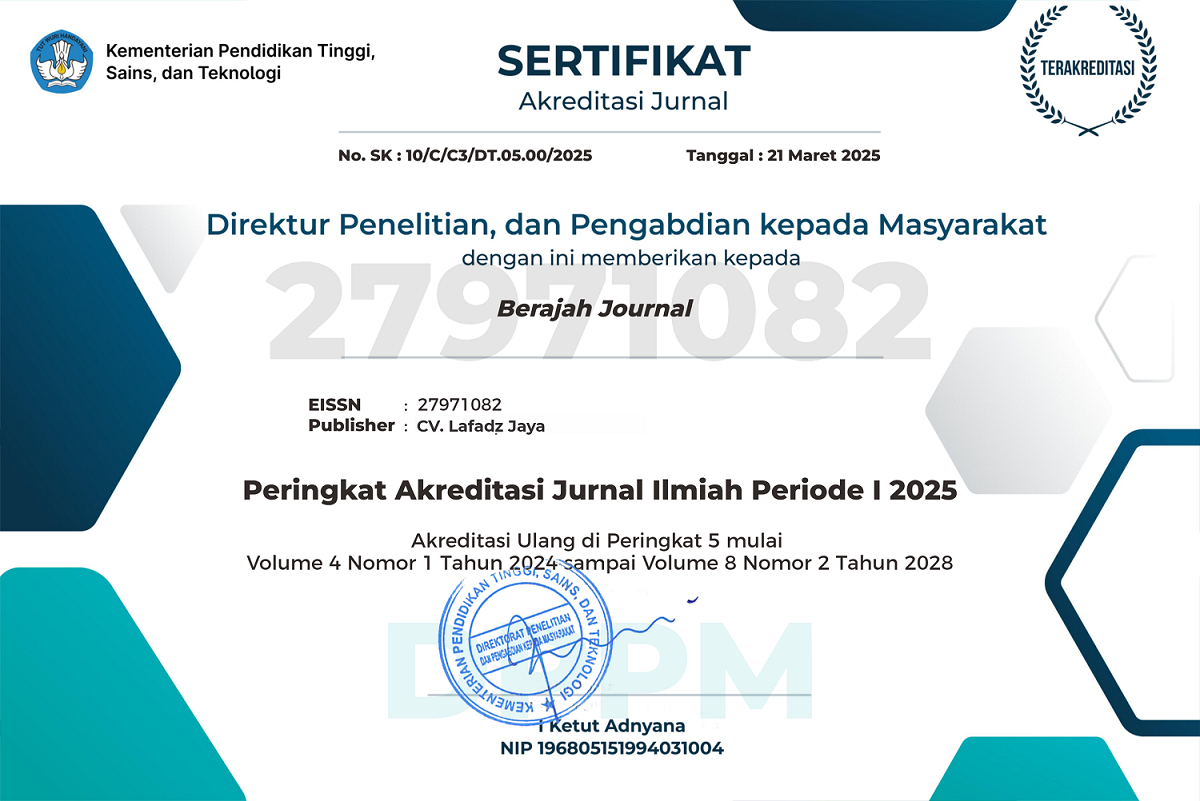HUBUNGAN SELF-COMPASSION DENGAN PSYCHOLOGICAL WELL-BEING PADA WANITA KORBAN KEKERASAN DALAM RUMAH TANGGA
DOI:
https://doi.org/10.47353/bj.v2i3.125Keywords:
Self-Compassion, psychological well-being, wanita, korban kekerasan dalam rumah tanggaAbstract
Tujuan dari penelitian ini adalah mengetahui hubungan antara self-compassion dengan psychological well-being pada wanita korban kekerasan dalam rumah tangga. Penelitian ini merupakan penelitian kuantitatif dan partisipan dalam penelitian ini berjumlah 101 wanita dengan rentang usia 19-40 tahun yang mengalami kekerasan dalam rumah tangga dengan usia pernikahan maksimal 10 tahun. Pengumpulan data menggunakan metode survei dan alat ukur yang digunakan adalah self-compassion scale milik Kristin Neff (2003) dan psychological well-being scale milik Ryff (1989). Hasil dari penelitian ini menunjukkan nilai signifikansi 0,000 (p<0,05) dan nilai koefisien Pearson sebesar 0,854. Kesimpulan dari penelitian ini terdapat hubungan yang positif dengan derajat hubungan yang kuat antara self-compassion dengan psychological well-being pada wanita korban kekerasan dalam rumah tangga.
Downloads
References
Allen, A. B., Cazeau, S., Grace, J., & Banos, A. S. (2021). Self-Compassionate Responses to an Imagined Sexual Assault. Violence Against Women, 27(3–4), 574–596. https://doi.org/10.1177/1077801220905631
Allen, A. B., & Leary, M. R. (2010). Self-Compassion, Stress, and Coping. Social and Personality Psychology Compass, 4(2), 107–118. https://doi.org/10.1111/j.1751-9004.2009.00246.x
Anjani, C., & Suryanto. (2006). Pola Penyesuaian Perkawinan pada Periode Awal. INSAN, 8(3), 198–210.
Anjari, W. (2014). FENOMENA KEKERASAN SEBAGAI BENTUK KEJAHATAN (VIOLENCE). Journal WIDYA Yustisia, 42.
Aslan, E., Bodur, G., Beji, N. K., Alkan, N., & Aksoy, Ö. (2019). Exposure to domestic violence in women living in istanbul and aegean regions: A turkish sample. Ciencia e Saude Coletiva, 24(8), 2835–2844. https://doi.org/10.1590/1413-81232018248.22952017
Azhari, D. A. (2019). Hubungan Antara Self-Compassion dengan Psychological Well-Being pada Remaja. Universitas Airlangga.
Aziz, N. N. A., Idris, S. A. M., Ishak, M., Wahid, N. A., & Yazid, Z. N. A. (2018). Factors Affecting Domestic Violence Against Women: A Conceptual Model and Research Propositions. Internasional Journal of Studies on Children, Women, Elderly And Disable, 4, 191–198.
Basar, F., & Demirci, N. (2018). Domestic violence against women in Turkey. Pakistan Journal of Medical Sciences, 34(3), 660–665. https://doi.org/10.12669/pjms.343.15139
Castro, R. J., Cerellino, L. P., & Rivera, R. (2017). Risk Factors of Violence against Women in Peru. Journal of Family Violence, 32(8), 807–815. https://doi.org/10.1007/s10896-017-9929-0
Costa, E. C. V., & Botelheiro, A. A. L. P. (2021). The impact of intimate partner violence on psychological well-being: Predictors of posttraumatic stress disorder and the mediating role of insecure attachment styles. European Journal of Trauma & Dissociation, 5(1), 100151. https://doi.org/10.1016/j.ejtd.2020.100151
Dillon, G., Hussain, R., Loxton, D., & Rahman, S. (2013). Mental and Physical Health and Intimate Partner Violence against Women: A Review of the Literature. International Journal of Family Medicine, 2013, 1–15. https://doi.org/10.1155/2013/313909
Fajrini, F., Ariasih, RR. A., & A, N. L. (2018). Determinan Sikap Tindak Kekerasan Dalam Rumah Tangga di Provinsi Banten. Aspirasi: Jurnal Masalah-Masalah Sosial, 9(2), 173–189.
Flury, M., Nyberg, E., & Riecher-Rössler, A. (2010). Domestic violence against women: Definitions, epidemiology, risk factors and consequences. In Swiss Medical Weekly (Vol. 140, Issue NOVEMBER, pp. 23–27). https://doi.org/10.4414/smw.2010.13099
Herrenkohl, T. I., Klika, J. B., Herrenkohl, R. C., Russo, M. J., & Dee, T. (2012). A prospective investigation of the relationship between child maltreatment and indicators of adult psychological well-being. Violence and Victims, 27(5), 764–776. https://doi.org/10.1891/0886-6708.27.5.764
Homan, K. J. (2016). Self-Compassion and Psychological Well-Being in Older Adults. Journal of Adult Development, 23(2), 111–119. https://doi.org/10.1007/s10804-016-9227-8
Hurlock, E. B. (2004). Psikologi Perkembangan: Suatu Pendekatan Sepanjanga Rentang Kehidupan Edisi Kelima (5th ed.). Erlangga.
Kilis, G. (2015). Dinamikan Konflik Suami-Istri Pada Masa Awal Pernikahan. Psikologika, 19(2), 176–186.
Kinyondo, A., & Joseph, M. (2021). Women’s employment status and domestic violence in Tanzania: How do they link? International Journal of Social Welfare, 30(2), 216–225. https://doi.org/10.1111/ijsw.12440
Kulu, H. (2014). Marriage Duration and Divorce: The Seven-Year Itch or a Lifelong Itch? Demography, 51(3), 881–893. https://doi.org/10.1007/s13524-013-0278-1
Majelis Umum Perserikatan Bangsa-Bangsa. (1993). Dekralasi Tentang Penghapusan Kekerasan Terhadap Perempuan.
NEFF, K. (2003). Self-Compassion: An Alternative Conceptualization of a Healthy Attitude Toward Oneself. Self and Identity, 2(2), 85–101. https://doi.org/10.1080/15298860309032
Neff, K. D., & Costigan, A. P. (2014). Psychologie und Glücklichsein … Self-Compassion, Wellbeing, and Happiness Mitgefühl mit sich selbst, Wohlbefinden und Glücklichsein. In Psychologie in Österreich (Vol. 2).
Renggani, A. F., Putu, D., & Widiasavitri, N. (2018). Peran Self-Compassion terhadap Psychological Well-Being Pengajar Muda di Indonesia Mengajar. Jurnal Psikologi Udayana, 5(2), 418–439.
Ryff, C. D. (1995). Psychological Well-Being in Adult Life. Current Directions in Psychological Science, 4(4), 99–104. https://doi.org/10.1111/1467-8721.ep10772395
Setiawan, C. N., Kirana, S., Bhima, L., & Dhanardhono, T. (2018). FAKTOR-FAKTOR YANG MEMENGARUHI KEJADIAN KEKERASAN DALAM RUMAH TANGGA DAN PELAPORAN PADA PIHAK KEPOLISIAN. Januari 2018 JKD, 7(1), 127–139.
Syafei Antonio. (2021). Peran Mindfulness dan Self Compassion Terhadap Psychological Well Being pada Korban Pelecehan Seksual Online. Skripsi, 1–90.
Tarber, D. B. (2014). Male Survivors of Childhood Maltreatment: Examining the Relationship between Self-Compassion and Psychological Well-Being. Dissertation, 1–180.
Tarber, D. N., Cohn, T. J., Casazza, S., Hastings, S. L., & Steele, J. (2016a). The Role of Self-compassion in Psychological Well-being for Male Survivors of Childhood Maltreatment. Mindfulness, 7(5), 1193–1202. https://doi.org/10.1007/s12671-016-0562-4
Tarber, D. N., Cohn, T. J., Casazza, S., Hastings, S. L., & Steele, J. (2016b). The Role of Self-compassion in Psychological Well-being for Male Survivors of Childhood Maltreatment. Mindfulness, 7(5), 1193–1202. https://doi.org/10.1007/s12671-016-0562-4
Voci, A., Veneziani, C. A., & Fuochi, G. (2019). Relating Mindfulness, Heartfulness, and Psychological Well-Being: the Role of Self-Compassion and Gratitude. Mindfulness, 10(2), 339–351. https://doi.org/10.1007/s12671-018-0978-0
Whitehead, R., Bates, G., Elphinstone, B., & Yang, Y. (2021). The relative benefits of nonattachment to self and self-compassion for psychological distress and psychological well-being for those with and without symptoms of depression. Psychology and Psychotherapy: Theory, Research and Practice, 94(3), 573–586. https://doi.org/10.1111/papt.12333
Wong, J. (2014). Intimate partner violence and women’s health and wellbeing: Impacts, risk factors and responses.
World Health Organization. (2021, March 9). Violence Against Women. World Health Organization, 1–1. https://www.who.int/news-room/fact-sheets/detail/violence-against-women
Zessin, U., Dickhäuser, O., & Garbade, S. (2015). The Relationship Between Self-Compassion and Well-Being: A Meta-Analysis. Applied Psychology: Health and Well-Being, 7(3), 340–364. https://doi.org/10.1111/aphw.12051
Downloads
Published
How to Cite
Issue
Section
License
Copyright (c) 2022 Nadia Ramadhan, Achmad Chusairi

This work is licensed under a Creative Commons Attribution 4.0 International License.






















